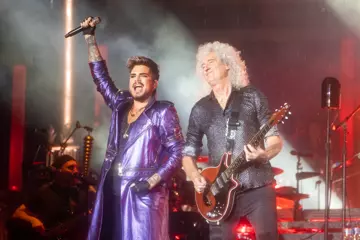A cool, commanding blonde straight out of a Hitchcock movie, Anne Hamilton-Byrne had the ability to bewitch and beguile. In the 1960s and '70s, a time when mainstream society was starting to explore alternative lifestyles, Hamilton-Byrne, her husband Bill and a handful of acolytes formed The Family, gathering additional followers and eventually even children — some born to Family members, some adopted by unethical or illegal means — who regarded Hamilton-Byrne as a messiah: a messiah who condoned starvation, beatings and regular doses of LSD as methods of maintaining control.
"I think she had an uncanny ability to recognise and target people's weak spots — she would offer something in the beginning and then take it away so they were dependent on her."
Hamilton-Byrne is now in her 90s, living in a nursing home and suffering from advanced dementia, but The Family still exists, even after a police raid in the late 1980s liberated dozens of The Family's children from the sect's rural compound. The story of Anne Hamilton-Byrne and The Family has been told in a variety of forms over the last few decades by various news outlets but Rosie Jones' documentary The Family offers a somewhat comprehensive and quite compelling overview of the sect, the people drawn into its web and the woman who oversaw it all.
Jones first became interested in The Family when she moved to Melbourne from Sydney in the mid-'00s. "It intrigued me the way I imagine it intrigued many other people," she says. But it wasn't until she met a Family member while researching another documentary that her interest was rekindled. Further investigation revealed that police detective Lex de Man, one of the officers most deeply involved in the case against The Family, "was still talking about it, had kept a lot of information and wanted to tell his story".
From there, it was a matter of "working from the outside in", gaining the confidence of people raised by The Family as children and convincing them to share their stories. It's a big ask, especially as many still carry the physical and psychological scars of their time under the sway of Hamilton-Byrne and her followers. "Everyone is affected differently, everyone has found their own way of dealing with that childhood trauma," says Jones. "Christianity, therapy... many of them have children, and it was difficult making that transition, having had this kind of upbringing. But I think it helps connect people and gives them some kind of motivation to move forward through life."
Don't miss a beat with our FREE daily newsletter
So what was it about The Family that attracted so many people, and indeed continues to do so? (There are people in Jones' film who still refer to the Hamilton-Byrnes as "Mum and Dad"). Was it her personal charisma? Was it the 'find yourself' ethos of the era?
"There was something about Anne's personality that drew people to her," says Jones. "I think she had an uncanny ability to recognise and target people's weak spots — she would offer something in the beginning and then take it away so they were dependent on her. Someone like her can flourish, and does. But I also think there was a particular confluence of ideas that happened in this period that allowed this particular sort of group to flourish. In the 1960s, people were rejecting the values of the previous decade and searching for meaning but were unsure of what they wanted. These were intelligent and good-natured people, and there was an openness to new ideas. I think it's such a pity Anne's talents were not harnessed for something good and positive. But she thrived on the control."















